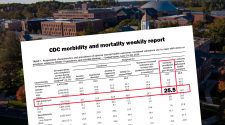Across the globe, countries weigh easing restrictions, even as new clusters emerge.
As the number of people around the globe confirmed to have been infected with the coronavirus passes 1.8 million, countries are finding themselves at various stages of their own outbreaks and struggling to balance the medical benefits of keeping restrictions in place and the risks that come with getting their economies moving again.
The preventive measures in many countries have taken the form of lockdowns. And while some places try to mimic the policies of nations that have curbed their outbreaks and others introduce their own measures, there is no clear path for the next steps.
Spain has also started to ease its restrictions, with some construction workers and others set to head back to work this week after a two-week shutdown that touched nearly every industry. The number of deaths rose slightly over the weekend, however, and the decision about whether to pull back to help get the economy moving again will fuel the debate about whether the government is taking too much risk too soon.
The crisis seems to be easing in parts of Europe, but cases continue to mount elsewhere, including in the United States, which is now squarely at the center of the global outbreak with more than 555,000 confirmed cases and 22,000 deaths.
Even as new infections and hospitalizations in New York and other hard-hit areas have stabilized in recent days, Dr. Anthony S. Fauci, the country’s top infectious disease expert, said that any future measures to ease lockdowns should be part of a slow and considered process.
Britain’s lockdown, which is set to expire on Monday, will continue until the government decides on parameters for formally lengthening restrictions. That decision is expected to come later in the week.
The country’s death toll was over 11,000 as of Monday. And while officials warned that Britain was still days away from a peak of new cases, Prime Minister Boris Johnson was released from the hospital on Sunday after being treated for the virus.
President Emmanuel Macron of France announced an extension of his country’s lockdown in a televised address on Monday, as the country approaches 100,000 total cases and 15,000 deaths.
In China, where the number of cases has eased in recent weeks, a surge in new infections has been linked to a return of Chinese citizens from Russia, a country that is now experiencing its own uptick.
Some areas of Japan that are experiencing a new wave of infections have declared a state of emergency for a second time, an example of how initial successes from social distancing and restrictions on movement can fade once they are relaxed.
President Vladimir V. Putin of Russia offered his bleakest comments yet on his country’s handling of the pandemic, warning officials on Monday that the number of severely ill patients was rising and that medical workers faced shortages of protective equipment.
“We have a lot of problems, and we don’t have much to brag about, nor reason to, and we certainly can’t relax,” Mr. Putin told senior officials in a televised videoconference that he conducted from his residence outside Moscow. “We are not past the peak of the epidemic, not even in Moscow.”
Russia’s total number of confirmed cases reached 18,328, double the level of five days earlier, with roughly two-thirds of them in Moscow. The number of deaths stood at 148 nationwide.
Moscow’s health system in particular was under growing strain, and state television reported hours-long lines of ambulances waiting to admit suspected coronavirus patients into hospitals. The authorities tightened their lockdown on the city of 13 million people, directing residents to apply online for permission to leave their homes.
Mr. Putin’s dour tone Monday was part of a sharp shift in Russia’s official rhetoric on the crisis, with hope fading that the country might escape being hit hard by the pandemic. He directed officials to remedy shortages in medical workers’ protective equipment and to share ventilators and medicine across Russia’s far-flung regions to respond to geographic differences in demand.
“All scenarios of how the situation could develop must be taken into account, including the most difficult and extraordinary ones,” Mr. Putin said.
France’s lockdown, which severely restricts movement and gatherings, will continue for at least four more weeks, until May 11, President Emmanuel Macron of France announced on Monday.
“The epidemic is not yet under control,” Mr. Macron said in a televised address.
May 11 will mark a major turning point in the fight against the coronavirus, he said, when schools will reopen and many people will be able to return to work.
But even as some restrictions are lifted or loosened, he warned, others will stay in place. Many businesses — like cafes, restaurants, museums or hotels — will remain closed, Mr. Macron said, and the most vulnerable citizens, like the elderly or the disabled, will remain confined, “at least initially.”
He said that beginning a “new stage” in the epidemic next month will be made by possible by widespread testing and isolation, as France’s response grows steadily more robust. From May 11 onward, anyone with symptoms will get access to testing, Mr. Macron promised, and positive cases will be quarantined and followed by a doctor.
Mr. Macron also vowed that after that date, all French people would be able to procure so-called “general public” masks, which are less protective than those for health workers.
He also said that travel from countries outside the European Union would remain prohibited “until further notice.”
The toll of the virus in France, where it has killed more than 14,000 people, appears to have reached a plateau, with the number of patients in intensive care, and the daily number of new deaths, both declining slowly.
But the authorities say it is too early to know whether the unprecedented strain on France’s vaunted health system is easing.
Monday was supposed to be the day when Britain might have started to lift its lockdown, but with no sign yet that the epidemic there is abating, the government is expected to leave the restrictions in place until well into next month.
The country reported 717 new deaths from the virus, bringing its total to 11,329. It has 88,621 confirmed cases, surpassing the reported total in China.
When Prime Minister Boris Johnson imposed the lockdown on March 23, he said the government would review it on April 13. But officials have signaled it is too soon to ease the measures.
“We have come too far, lost too many loved ones and sacrificed too much to ease up,” Foreign Secretary Dominic Raab said on Monday at a news conference.
The latest death figure was smaller than those reported late last week, but numbers are typically lower on the weekend because of a lag in reporting.
China’s number of confirmed cases is widely suspected to be understated, though medical experts said the number of infected people in Britain was also likely higher because of a lack of widespread testing.
Britons were cheered on Sunday after Mr. Johnson was released from the hospital following his own serious bout with the virus. But now, as he convalesces at his country residence, Chequers, attention is shifting back to the broader trajectory of the outbreak, which is increasingly worrisome.
The number of known infections and fatalities is rising faster in Britain than anywhere else in Europe, putting it on track to reach the death totals in Italy and Spain.
Jeremy Farrar, a leading British medical researcher who is director of the Wellcome Trust, told the BBC on Sunday that Britain is “likely to be one of the worst, if not the worst, affected countries in Europe.”
Millions of migrant workers in Persian Gulf countries have found themselves locked down, laid off and stranded, with no place to turn for help amid the coronavirus outbreak. Qatar alone has locked down tens of thousands of migrant workers in a crowded neighborhood, raising fears of a rampant spread of the virus there.
Companies in Saudi Arabia have told foreign laborers to stay home — then stopped paying them. In Kuwait, an actress said on television that migrants should be thrown out “into the desert.”
The oil-rich monarchies of the Persian Gulf have long relied on armies of low-paid migrant workers from Asia, Africa and elsewhere to do the heavy lifting in their economies, and have faced criticism from rights groups for treating those laborers poorly.
Now, the coronavirus has made matters worse, as migrants in Gulf States are locked down in cramped, unsanitary dorms, deprived of income and unable to return home because of travel restrictions.
Some are running out of food and money, and fear that they have no place to turn in societies that often treat them like an expendable underclass.
“Nobody called us,” said Mohamed al-Sayid, an Egyptian restaurant worker who lives with seven friends in a one-room apartment in Jeddah, Saudi Arabia — and all are now unemployed. “Nobody checked on us at all. I’m not afraid of corona. I’m afraid we’ll die from hunger.”
In his seven years in power in Venezuela, President Nicolás Maduro has weathered a series of crises and attempts to topple him, always emerging in firm control despite his country’s tattered economy.
But the coronavirus pandemic is contributing to his greatest challenge yet.
Around the world, lockdowns to contain the virus have caused demand and prices for oil, Venezuela’s main export, to plummet. Last month his ally, Russia, and Saudi Arabia entered into an oil price war that suppressed prices even further.
Then the Russian oil giant, Rosneft, Venezuela’s main trading partner, halted operations there. Venezuela’s output of oil collapsed; not only was it too cheap to produce profitably, the country had lost its main outlet for selling crude or trading it for refined gasoline.
Gasoline supplies fell sharply, bringing much of Venezuela to a standstill.
Now the deadly pandemic is spreading through Latin America and reaching into Venezuela, a country whose health care systems have deteriorated so far that they lack even the most basic supplies.
“The regime is in survival mode,” said Michael Penfold, a Caracas-based fellow at the Wilson Center, a research group. “The country is entering into a very fragile equilibrium that’s going to be increasingly difficult to maintain.”
Mr. Maduro, who was recently indicted in the United States on drug charges, was among the first Latin American leaders to act against the virus, rolling out a national lockdown on March 15 — compounding the economic calamity — two days after confirming the first infection in the country.
As of Monday, the government said, there had been 181 cases and nine deaths, but it is hard to gauge how many have gone unreported.
In an example of how initial successes of a social distancing campaign can fade once restrictions are relaxed, Hokkaido, Japan’s northernmost island, declared a state of emergency for a second time on Sunday and called on residents to stay at home for all but the most essential outings.
Hokkaido’s governor said the government was taking action because of a second wave of infections. Long before Japan’s central government issued a state of emergency for the country’s seven largest prefectures last week, Hokkaido called for a soft lockdown of the region on Feb. 28. As cases appeared to come under control, the prefecture lifted the state of emergency two weeks later and slowly allowed schools to reopen.
Overall case numbers remain low in Hokkaido, but the government is concerned about how quickly they are multiplying. Four new cases were confirmed on April 7, and that figure tripled within five days.
On Sunday, Hokkaido and Sapporo, the provincial capital, asked residents to refrain from going out, cease traveling and avoid restaurants — particularly for “business entertainment.”
In Osaka, Japan’s third-largest city, the governor urged on Monday that businesses like night clubs, internet cafes, karaoke venues, pachinko parlors, movie theaters, gyms, museums and libraries close until May 6. The move followed similar requests in Tokyo.
Under the law authorizing the state of emergency, governors have the power only to request that businesses close. Those who do not comply can be publicized, but not officially punished.
Japan’s health ministry reported 530 new cases and four deaths on Sunday, taking Japan’s total to 7,255 cases and 102 deaths. Tokyo reported 166 new cases on Sunday, more than half of which were concentrated in one hospital — the latest of several recent clusters at the country’s hospitals.
A surge of Chinese people returning from Russia, which is now experiencing its own spike in infections, has fueled the largest increase in reported new cases in China in more than a month.
Chinese officials said on Monday that 98 new infections were reported among people who recently arrived in China. Most of those were Chinese citizens who had apparently scrambled to return to their homeland after China limited flights in and out of the country.
Previously, an Aeroflot flight from Moscow to Shanghai on April 10 carried 60 people who ultimately tested positive for the coronavirus. The passengers were all quarantined.
That flight arrived just days after China said that it would close, effective Monday, its last overland crossing at Suifenhe, a small city across the border from Russia’s Far East.
Many Chinese people seeking to leave Russia have flown from Moscow to Vladivostok in hopes of completing the last leg by land. The Chinese Consulate in Vladivostok said in a statement on Sunday that 243 Chinese citizens infected with the coronavirus had already crossed the border.
So many cases have emerged in the borderlands that the local government has opened a temporary hospital to deal with the caseload.
Russia closed its borders with China in January, hoping to staunch the spread of the pandemic, only to find itself facing a belated spike in cases. By Monday, Russia had nearly 16,000 cases and at least 130 deaths.
For the fourth time in six days, Italian officials reported fewer than 600 coronavirus-linked deaths on Monday, a significant drop from the peak of the country’s crisis in late March and early April, when it was averaging about 800 fatalities per day.
And even as the total number of fatalities surpassed 20,000 on Monday, officials and public health experts in the country said the reductions of new cases and fatalities were evidence of a hopeful turn.
“The trend is now trustworthy,” Luca Richeldi, a pulmonologist who is on the scientific committee that is advising the government, said at a news conference. “Putting together the drop of people being hospitalized, patients in I.C.U. and the number of people dying, we can say that the measures that were adopted and extended are having an impact on this virus.”
Italy reported 566 deaths on Monday and 431 on Sunday, the lowest figure in more than three weeks.
Officials also said that for the tenth day in a row, the number of people hospitalized in intensive care fell on Monday.
The drop in numbers has considerably relieved the pressure on Italy’s national health system, Dr. Richeldi said, which had been strained by an influx of patients last month.
As of Monday, more than 159,000 people in Italy have tested positive for the coronavirus, surpassed in Europe only by Spain — an increase that Dr. Richeldi attributed in part to an uptick in testing.
Angelo Borrelli, the head of the Civil Protection Department, said that the group of experts who are managing the next phase of the government’s response had met with Prime Minister Giuseppe Conte over the weekend. The committee is working on an “inventory of solutions and proposals,” Mr. Borrelli said.
While the government has extended lockdown measures until May 3, businesses like children’s clothing stores and stationery and book shops will reopen on Tuesday.
At bus stops and subway stations in Madrid on Monday, transit workers and police officers handed out face masks to commuters who showed papers indicating that they were returning to work. A partial loosening of restrictions, the government’s first step in easing a national lockdown, comes amid political feuding over whether the move will reignite an outbreak.
The reopening of construction sites and factories begins on Monday in half of Spain’s 17 regions, with others following on Tuesday. Other companies have been allowed to recall some employees.
The director of a Michelin factory in Valladolid told Spanish national television that workers would return gradually. And Alu Ibérica, an aluminum company, resumed its recycling activities on Monday with a third of its work force.
The government also issued recommendations for workers, including washing clothes at high temperatures after returning home and using their own water bottles rather than drinking from water fountains.
Prime Minister Pedro Sánchez said on Sunday that the general lockdown was still in place. “The only thing that has ended is the extreme measure of hibernation” of the economy, he said.
On Monday, Spain reported a decline in the daily casualty rate — with 517 dead overnight, brining the overall tally to nearly 17,500, the second highest in Europe.
Some regional leaders, opposition politicians and labor unions said they feared that the partial return to work would set off a new wave of infections.
“Companies must have the means to protect us,” Pepe Álvarez, the secretary general of the UGT union, told Spanish television. “Nobody can make us choose between working safely or facing difficulties to maintain our job.”
Li Wenliang, the Wuhan doctor who was threatened by the authorities for raising the alarm about the outbreak — and who later died of Covid-19 — is seen as a martyr by many people in China.
After his death on Feb. 6, supporters began to gather at his last post on Weibo, the social media platform, to grieve together. They have left more than 870,000 comments. Only posts by China’s biggest actors and pop stars can match those numbers, but even those lack the visceral response that Dr. Li’s last post has drawn.
Li Yuan, who writes the New New World column for The New York Times, focusing on the intersection of technology, business and politics in China and across Asia, read through thousands of the comments.
The page is sometimes called China’s Wailing Wall, a reference to the Western Wall in Jerusalem where people leave written prayers in the cracks.
Some people post a few times a day, telling Dr. Li how their mornings, afternoons and evenings went. Because many people see him as an ordinary person wronged by the authorities and as a hero who stood up to power, they come to him to express their frustration that justice and righteousness haven’t prevailed.
Some people complain that the comments are censored, an allegation that is difficult to prove. They worry that his Weibo account could be deleted, just like many others. Then, they will lose the only place they can take a break from a world that has been turned upside down.
Oil-producing nations on Sunday agreed to the largest production cut ever negotiated, in an unprecedented coordinated effort by Russia, Saudi Arabia and the United States to stabilize oil prices and, indirectly, global financial markets.
It was unclear, however, whether the cuts would be enough to bolster prices. Before the coronavirus crisis, 100 million barrels of oil each day fueled global commerce, but demand is down about 35 percent. While significant, the cuts fall far short of what is needed to bring oil production in line with demand.
The plan by OPEC, Russia and other allied producers in a group known as OPEC Plus will slash 9.7 million barrels a day in May and June, or close to 10 percent of the world’s output.
The agreement was the result of more than a week of telephone conversations involving Mr. Trump; the Saudi crown prince, Mohammed bin Salman; and President Vladimir V. Putin of Russia. It should bring some relief to struggling economies in the Middle East and Africa and global oil companies, including American firms that directly and indirectly employ 10 million workers.
The reaction in oil markets on Monday was largely muted. Brent crude, the international benchmark, was unchanged at $31.47 a barrel, while West Texas Intermediate, the main U.S. marker, was up 1 percent to $22.98 a barrel.
“This is at least a temporary relief for the energy industry and for the global economy,” said Per Magnus Nysveen, head of analysis for Rystad Energy, a Norwegian consultancy. “The industry is too big to be let to fail.”
A small study of chloroquine, which is closely related to the hydroxychloroquine drug that President Trump has promoted, was halted in Brazil after coronavirus patients taking a higher dose developed irregular heart rates that increased their risk of a potentially fatal arrhythmia.
The study, which involved 81 hospitalized patients in the city of Manaus, was sponsored by the Brazilian state of Amazonas. Roughly half the participants were prescribed 450 milligrams of chloroquine twice daily for five days, while the rest were prescribed 600 milligrams for 10 days.
Within three days, researchers started noticing heart arrhythmias in patients taking the higher dose. By the sixth day of treatment, 11 patients had died, leading to an immediate end to the high-dose segment of the trial.
“To me, this study conveys one useful piece of information, which is that chloroquine causes a dose-dependent increase in an abnormality in the E.C.G. that could predispose people to sudden cardiac death,” said Dr. David Juurlink, an internist and the head of the division of clinical pharmacology at the University of Toronto, referring to an electrocardiogram, which reads the heart’s electrical activity.
The researchers said the study did not have enough patients in the lower-dose trial to conclude whether chloroquine was effective in patients with severe cases of Covid-19, the disease caused by the coronavirus.
Patients in the trial were also given the antibiotic azithromycin, which carries the same heart risk. Hospitals in the United States are using azithromycin to treat coronavirus patients, often in combination with hydroxychloroquine.
President Trump has promoted them as a potential treatment for the coronavirus despite little evidence that they work, and despite concerns from health officials. Companies that manufacture both drugs are ramping up production.
With infections and deaths still rising in the United States, public health and business experts warned Monday that the country’s devastated economy will be slow to recover.
President Trump is eager to ease lockdown measures and minimize the economic damage. Governors are urging caution, fearing a resurgence of the coronavirus, while the president’s trade adviser, Peter Navarro, said the shutdown could do more damage to the nation’s health than the virus, itself.
Dr. Robert Redfield, the director of the Centers for Disease Control and Prevention, said Monday that he expected reopening to play out “community by community,” but that it would require the country to “substantially augment our public health capacity.”
The United States has had more than 555,000 confirmed cases and over 22,000 deaths from the epidemic, more than any other country has reported.
In New York, the hardest-hit state, the death toll passed 10,000 on Monday, but Gov. Andrew Cuomo said “the worst is over if we continue to be smart.” The number of coronavirus-related hospital admissions and deaths, though high, continued to decline.
Compared to the Northeast, California, Washington and Oregon, which were hit first by the virus, continued to do fairly well. Experts said that relative success reflects the West Coast states’ earlier, more aggressive efforts to shut down public life.
And in Guam, a crew member of the aircraft carrier Theodore Roosevelt died from Covid-19, the first fatality from the outbreak aboard a ship whose captain, Brett E. Crozier, had said that the Pentagon was not treating the outbreak seriously enough.
The captain, who is ill with the virus, was removed from his post when his complaints became publicly known. More than 580 of the ship’s crew members have been infected.
Airlines have canceled a staggering number of flights, but thousands still take off every day, leaving many in the industry reckoning with whether to continue working and how to stay safe if they do.
Hundreds of flight attendants and pilots have fallen ill, and at least five have died from the coronavirus, according to to the labor unions that represent them.
Tens of thousands of airline employees have taken unpaid leave, staying home out of necessity or concern, or to free up slots for colleagues who may need the income more. But some have continued to show up, either because they need the money or fear losing their jobs once the crisis has ebbed.
Flight attendants and pilots at several major airlines said they had had to take their own gloves and masks to work. Even when airlines have committed to providing protective equipment, many have run into the same supply problems that have plagued hospitals.
Air travel has fallen to new lows: For the first time since its formation, the U.S. Transportation Security Administration screened fewer than 100,000 people per day at its checkpoints on at least three occasions this month. It screened more than two million people per day at this time last year.
Reporting was contributed by Anatoly Kurmanaev, Richard Pérez-Peña, Karen Zraick, Anton Troianovski, Li Yuan, Elisabetta Povoledo, Raphael Minder, Aurelien Breeden, Constant Méheut, Megan Specia, Motoko Rich, Carlotta Gall, Mark Landler, Steven Lee Myers, Claire Fu, Ronen Bergman, Niraj Chokshi, Clifford Krauss and Ruth Maclean.














